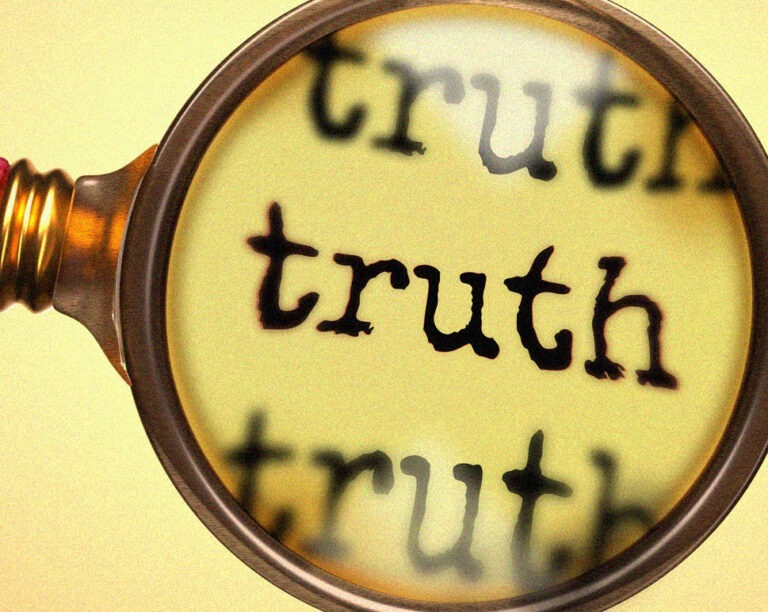Comments
What the Heck Are We Doing? Is It Possible to Get Back to Embracing the Truth?
In 2024, how much does the truth matter, really?
The answer should always be always, and, goodness, is there any doubt that we need to work more diligently toward that target again? In an era where misinformation spreads faster than a viral meme, it’s time we take a hard look at our relationship with the truth. Have we lost our way so drastically that we can no longer distinguish fact from fiction? It’s high time we made a more vigorous effort to do the right thing because, at the end of the day, truth is the right thing to do.

It seems that some people will accept facts as truth only if the facts agree with what they already believe. On the face of it, is our world truly a community waiting to be offended by something? Why are we so quick to embrace anything put before us?
It’s not a stretch to assert that the answer at least partially lies in the many digital platform beasts out there purposefully pummeling us with untruths. Social media, politics, and mainstream media have become breeding grounds for misinformation, and we, the consumers, are often too quick to accept, without question, what we see and hear. We’re playing a dangerous game with higher stakes than ever.
The good news is it’s never too late to be cautious and vigilant.
The Many Faces of Truth: Let’s Set the Record Straight
In our modern world, truth often feels like a slippery eel, wriggling out of our grasp just when we think we’ve got hold of it. We hear phrases like “my truth” and “your truth,” but let’s face it: truth isn’t a customizable smoothie where you pick your favorite ingredients. It is more like gravity — universal, non-negotiable, and not subject to personal whims. We all need to acknowledge and accept this universal truth.
Imagine if everyone could define their own gravity. One person floats to work, another sticks to the ceiling, and someone else drifts off into space. Chaotic, right? Similarly, when we bend the truth to fit our narratives, we create a world where reality becomes as unpredictable as a squirrel on caffeine.

The Big Lie: Bringing People Together for All the Wrong Reasons
Let’s discuss lies, specifically the big ones. You know, the whoppers that make your jaw drop, your eyebrows shoot up to your hairline, and your head nay-shake. Curiously, the bigger the lie, the more it seems to unite people. It’s like a bizarre social glue that binds believers together, creating an echo chamber where the lie reverberates louder and louder.
For example, take the age-old myth of the Loch Ness Monster. Despite countless scientific expeditions debunking its existence, Nessie enthusiasts remain unwavering. They gather, share stories, and reinforce each other’s beliefs. It’s a community built on a shared, albeit fantastical, narrative. The bigger the fabrication, the tighter the bond among its believers.

The Apparent Advantages of Not Telling the Truth
Why do people reflexively opt for deceit? What are the apparent advantages of not telling the truth? For some, it’s about gaining power, influence, or financial gain. In politics, for example, bending the truth can rally a base, secure votes, or discredit an opponent. In business, misleading statements can inflate stock prices or hide financial woes. But history tells us that these so-called advantages (not to mention a clear absence of shame) are fleeting and come at a significant cost — loss of trust, credibility, and, ultimately, integrity.
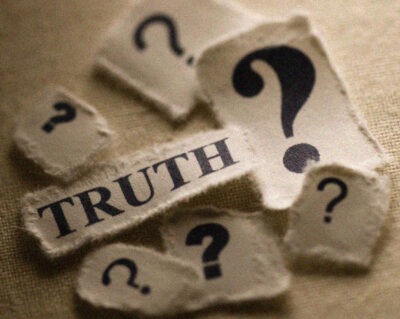
On the other hand, not telling the truth can also occur in everyday situations when someone simply tries to avoid consequences or embarrassment. For instance, a person might lie about why they’re late to work to dodge a reprimand, or a student might fabricate an excuse to avoid turning in an assignment on time. These lies are often told to escape immediate adverse outcomes. Still, they can quickly spiral into larger issues if the truth is uncovered.
The temporary relief gained by these small deceptions can lead to a pattern of dishonesty, undermining personal relationships and eroding self-respect. Ultimately, while misrepresentation might seem like a quick fix to sidestep accountability and effectively make desired strides, it often results in more significant problems down the road, as maintaining the lie can be more complicated and damaging than facing the truth.
Be Cautious. Be Careful. Be Truthful.
Logically, we must be cautious about what we accept as truth. Before sharing that sensational news story or believing that too-good-to-be-true claim, take a moment to verify its authenticity. Often, if one waits a day or three, the actual truth starts to emerge as more details about the story are revealed. Bottom line: the truth serves a great purpose, and it is our responsibility to identify and uphold it.
Fact-Checking: A Crucial Practice
Fact-checking and verification should be second nature to us. In an age of information overload, fact-checking has become more critical than ever. It’s not just about verifying the facts; it’s about cultivating a mindset of skepticism and critical thinking. Before forming opinions or sharing information, seek reliable sources and cross-check the data. This practice helps us stay informed and protects us from the dangers of misinformation.
One of the best lists of websites for fact-checking is produced by the College of Staten Island. It’s a guide developed by the Research Center at the CUNY Graduate School of Journalism. Access the list here, which includes a helpful, short bio about each site. I checked several sites offering such lists; everything on this list is found on other sites’ lists.
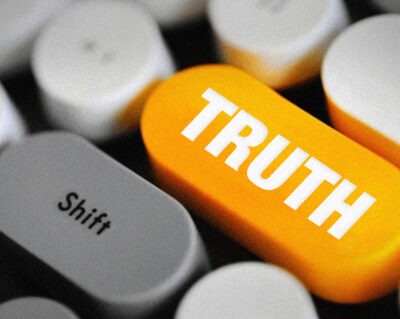
The Role of Politics in Our Relationship with the Truth
Politics undeniably influences how we perceive and interact with the truth. It’s not about pointing fingers at the right or left; it’s about recognizing that misinformation knows no political boundaries. Both sides of the aisle have been guilty of bending the truth to fit their agendas. It’s up to us, as citizens, to demand better. We must hold our leaders accountable and insist on transparency and honesty. Telling the truth should not be a revolutionary act.
The Power of Truth: A Call to Action
Again, there is no good or bad truth. There is only truth. And it is a powerful force that can bring clarity, build trust, and ultimately set us free.
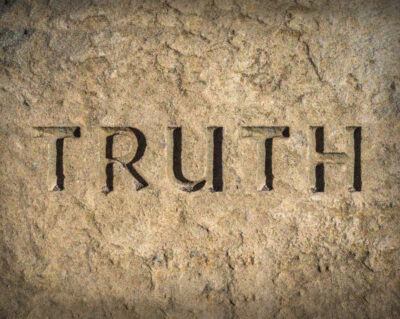
The Ripple Effect of Truth: Creating a Culture of Honesty
When we commit to living by the truth, we inspire others to do the same. This creates a ripple effect that spreads integrity and authenticity throughout our communities.
- Lead by Example: Whether you’re a parent, a manager, or just a friend, your commitment to the truth sets a powerful example. When others see you valuing honesty, they’re more likely to follow suit.
- Encourage Open Dialogue: Create environments — at home, work, or social gatherings — where people feel safe to speak the truth.
- Encourage questions, share perspectives, and express concerns without fear of judgment or retribution. When people know their voices matter, they’re more inclined to be honest.
- Celebrate Honesty: Recognize and celebrate moments of truthfulness. Whether it’s a child admitting they broke a vase or a colleague owning up to a mistake, acknowledging and appreciating their honesty reinforces the value of truth.
- Be Compassionate: Understand that the truth can sometimes be difficult to hear and even more challenging to tell. Approach honesty with compassion and empathy. When someone is brave enough to be truthful, especially in tough situations, offer support and understanding.
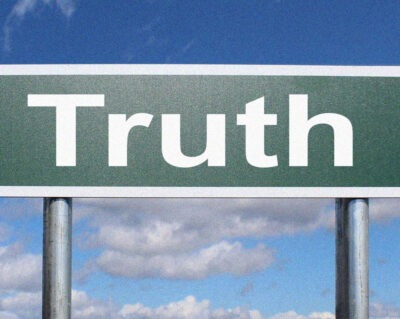
The Long-Term Benefits of Embracing THE TRUTH
Living by the truth isn’t just about avoiding the pitfalls of dishonesty; it’s about reaping the long-term benefits of a life grounded in reality. Are there rewards? You bet!
- Stronger Relationships: Trust is the bedrock of any meaningful relationship. When you’re honest with those around you, you build a foundation of trust that can withstand the test of time.
- Personal Growth: Facing the truth about ourselves — our strengths, weaknesses, and everything in between — allows us to grow and improve. Self-awareness is a powerful tool for personal development.
- Peace of Mind: When you live truthfully, you don’t have to keep track of lies or worry about being caught in a deception. This peace of mind is invaluable and leads to a more relaxed and fulfilling life.
- Credibility and Respect: In both personal and professional spheres, being known as someone who values the truth earns you credibility and respect. Or it certainly should! People are more likely to trust and rely on someone who embraces, nonstop, the truth.

The Humor in Truth: Lightening the Load
Humor has an interesting way of making the truth more palatable and even enjoyable. It’s like adding a spoonful of sugar to help the medicine go down.
In various aspects of life, honesty and a touch of humor can enhance communication and build stronger relationships. In the workplace, when a boss presents a less-than-stellar project idea, rather than simply agreeing, you might point out that the presentation was “an interesting concept, but let’s brainstorm ways to make it even better.” Or, with a smidgen of humor, “the idea has potential … in an alternate universe.” You know what I mean. Rather than not telling the truth, consider messages to soften the impact of criticism and encourage constructive dialogue.
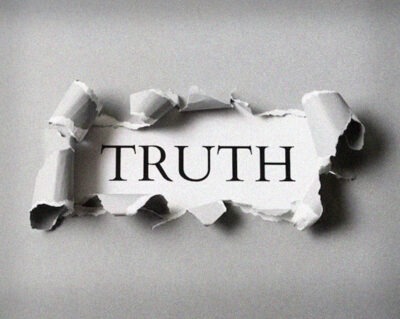
Similarly, with parenting, kids quickly detect dishonesty — e.g., vegetables taste like candy. C’mon! A better approach might be: “I know broccoli isn’t as fun as ice cream, but it’s like a superhero for your body.” This makes honesty fun and engaging for children.
The Ultimate Takeaway: Embrace THE TRUTH
In a world where the lines between fact and fiction often blur, embracing THE TRUTH is more important than ever. It isn’t about being rigid or harsh or pointing fingers; it’s about grounding ourselves in reality and fostering genuine connections with those around us. It’s about seeking the truth because truth is an undeniable beacon to guide us through the murky waters of misinformation and deceit. We must uphold it.
As I wrap up this journey through the landscape of truth, I leave you with this final thought: May your life be filled with the liberating light of truth, the joy of genuine connections, and the freedom that comes from living authentically. And remember, when in doubt, just tell the truth — it’s always the best story you can tell.
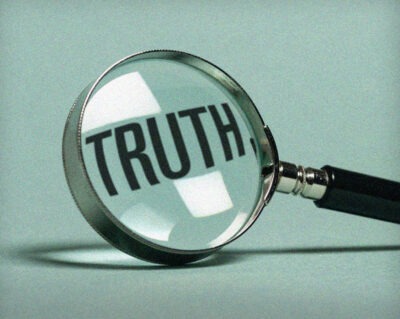
Subscribe to receive a heads-up of posts via email!
Cyndie Cox
The stupidity of embracing “alternate facts” boggles my mind. If you can’t win an argument/debate fairly, lie and hope people buy the lie. Its called gaslighting and it’s become part of our national conversation.
Lisa Pardue
Excellent, Lee. Speaking truth in love, is loving the one you’re speaking to.
Reed Sprague
No one writes about challenging subjects more constructively than you, Lee! Great post!
I am reminded of a debate we had years ago in one of my college history classes about the causes of a particular war. The vast majority of us students believed that we knew the facts [the truth] about the causes of the war based on what we had all learned about all that had been written about the war. Then one student spoke up with this quote: “History is written by the winners.” — Napoleon Bonaparte. I never forgot that. We are not skeptical enough of opinion writers who are not objective and who write as if they are stating irrefutable historical/scientific facts when they are, in “fact,” just stating their opinion.
There is no glory or ego feed in writing something like: “Here are the various opinions and the known facts. Now you [the reader] form your own opinion based upon each side’s opinions of the known facts.” The writer’s ego feed actually comes when the writer convinces you to “take his/her side.” In reality, the vast majority of writers should “report” the facts and the various opinions of those facts, and let the reader decide the good or bad of it all. Scan the internet and you find boatloads of created narrative that sound really good but is devoid of any truth at all. Not even worth reading! And yet people read it! And take it as gospel!
Michael R Carlson
Thanks for the thoughtful perspectives, Lee!
GARY MCCORKLE
One of your best, Sir Lee de Somerby!! Ironically, I am listening to a series by Chuck Swindoll and he had several moments addressing truth! Many of your points were corroborated by his. I do have a question about Snopes though. I used to rely heavily on it until a year or three ago; it seemed as if their analyses on many topics were slanted. Of course, maybe because I had my own preconceived opinion of “truth.” (Tongue firmly planted in cheek.)
Reed Sprague
I’ve noticed that Snopes sometimes changes an asserted statement just slightly so that they’re actually answering a different question than the one that should be asked based on the actual asserted statement under scrutiny. Most importantly, however, is that Snopes & other “fact checkers” often choose to check asserted statements from one side but not same-subject assertions from the other side. For example: telling me that Presidential candidate A lied X times during a debate with Presidential candidate B, without telling me how many times candidate B lied during the same debate is not helpful. No context. No perspective. It’s prejudicial. Biased.
Gary McCorkle
Read this again just now, my friend. One word jumped out at me — INTEGRITY. I’ve heard it defined as “doing what is right even when no one is looking.” I long for integrity in every day life.
Sam Dannaway
Snopes, nopes.
Robin Blakeman
I agree with you, Lee. I hate to say the good ole days, but it used to be that people would just tell the truth and take their consequences as kids. As young adults we tried hard to tell the truth but nowadays it seems to be an old fashioned concept

